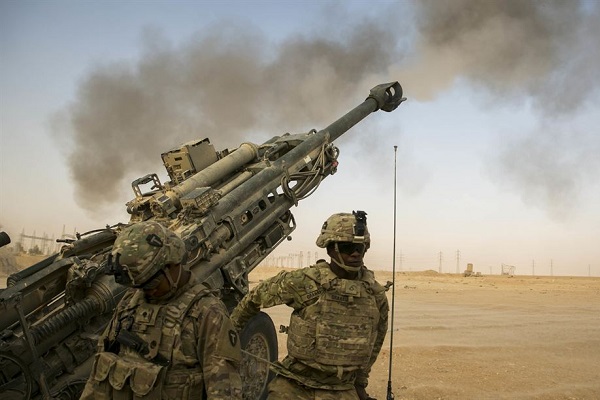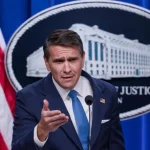
–>
December 24, 2022
On Friday, President Joe Biden signed the National Defense Authorization Act (NDAA) for 2023 into law. Conservative lawmakers like Senator Jim Inhofe (R-Okla.) — for whom the bill was formally named — and liberal lawmakers like Senator Jack Reed (D-R.I.) overwhelmingly supported it in the House and the Senate.
‘); googletag.cmd.push(function () { googletag.display(‘div-gpt-ad-1609268089992-0’); }); }
The bill has much to like. A summary provided by the aforementioned senators shows that it provides for the financial needs of servicemembers through pay raises and limited increased housing allowances and increases security cooperation with Taiwan to deter China. It also includes a hard won victory by social conservatives to repeal the absurd and harmful COVID-19 vaccine mandate. And The Heritage Foundation, known for its fiscal conservatism and its foreign policy hawkishness, praised the bill for being relatively focused on defense instead of unrelated political goodies and for removing gender identity language.
But as is normal when considering monstrous bills that come out of D.C., the good in the law may be outweighed by the bad, including but not limited to the following:
- Over 8,000 servicemembers who objected to the vaccine’s moral compromises and risks were summarily dismissed from the military. A Republican compromise means they will not be reinstated.
- The budget itself is unnecessarily enormous. The proper role of good government includes support for a strong military because without a functioning national defense, there’s no security for markets, businesses, and economic movement. However, our country’s military spending leaks like a sieve.
- There’s no accountability for those who use and abuse taxpayer dollars.
- Abortion funding was left in.
What is the NDAA?
‘); googletag.cmd.push(function () { googletag.display(‘div-gpt-ad-1609270365559-0’); }); }
Not to be confused with national defense appropriations, the NDAA is Congress’s formal authorization and direction for national defense spending. However, it does not provide any funding — that comes under the appropriations budget, which is separately approved by Congress. For decades, much of the funding has happened either as a standalone bill or as part of Continuing Resolutions, which Congress passes in short chunks to accommodate partisan backbiting and disagreements.
The NDAA is an important part of the federal budget because it provides the Pentagon and associated agencies (such as the Department of Energy, which was authorized for $30.3 billion in Fiscal Year 2023) direction and resource authority for spending money Congress will provide.
But just as eating is important to survival but can be abused, the NDAA is as bloated as some people’s waistlines. And its priorities are often closer to what politicians want than what the nation needs…or even what the Pentagon says is necessary for national defense.
There are undoubtedly many technical areas where national defense experts could tell us where the NDAA was Goldilocks — authorizing exactly right, too much, or not enough to many critical components of national security. As a free-market economist and practicing Catholic, my intention here is to examine the three straightforward areas laid out above.
Vaccine analysis
The good here is that the vaccine mandate is likely to be a thing of the past. Valid concerns about COVID-19 resulted in dictator-style mandates that shoved experimental vaccines with morally questionable developments into people’s bodies…all for the sake of “health.” And when patriotic servicemembers had legitimate moral, religious, and health concerns about the vaccines, thousands were told that those concerns were invalid for reasons of “good order and discipline.”
‘); googletag.cmd.push(function () { googletag.display(‘div-gpt-ad-1609268078422-0’); }); } if (publir_show_ads) { document.write(“
Republicans and conservatives deserve credit for standing strong in defense of thousands of current servicemembers whose careers are at risk. However, they weren’t able to force reinstatement of over 8,000 more servicemembers. Some of these people lost out on pay; others simply had their careers upended after years of honorable service. How this injustice will affect their lives is unknown — but the NDAA’s lack of reinstatement adds insult to injury.
Budget analysis
Very few people seem to care about the bloated federal budget despite the well known negative effects of high debt on economic growth and inflation. Even fewer people care about the Pentagon’s excessive spending — especially the politicians who use its largesse for their own gain.
The Pentagon has long stacked up wasteful dollars like hotcakes, and Congress often makes it worse by adding weapons and equipment costs solely for political reasons. And none of that includes the lies that kept us spending billions of dollars and thousands of lives in Afghanistan.
Thankfully, a few stalwart outside groups and members of Congress have done the work to keep the rest of us informed on the 2023 NDAA’s vast overspending:
- The conservative National Taxpayers Union (NTU) said that there’s no punishment mechanism for failing audits and that eight more F-35s were authorized for purchase than the Pentagon requested.
- NTU, R Street, and other fiscally conservative groups asked Congress to support House Armed Services Committee chairman Adam Smith (D-Wash.) in his efforts to retire a number of old ships. It looks like several of those ships will still be in service.
- Heritage highlights that more bureaucracy was created and a grant program was unnecessarily expanded.
Good people can reasonably disagree on the size, scope, and use of our military. But nobody should ignore tens of billions of dollars in spending that does nothing to increase national defense.
Accountability
A few lawmakers recognize that spending isn’t just a money problem. We didn’t waste billions of dollars and thousands of lives in Afghanistan because of poor spending practices. The real problem is a lack of accountability. Socialist Senator Bernie Sanders (I-Vt.) has been calling these issues out for years, especially the proven track record of misconduct prevalent among some contractors.
Consider Airbus, for example. It is the world’s largest airplane manufacturing company. It has multiple U.S. government contracts and is seeking a much larger one to provide flying tankers to the military. Flight Global reports that the 2023 NDAA opens the possibility to a non-competitive bidding process for the tanker contract.
Philosophically, this is an antithetical to free-market principles and should be appropriately described as state capitalism. Free-market competition creates merit-based opportunity for all; state capitalism favors those private actors who have developed the closest relationships with politicians, bureaucrats, and others who hold state power.
As importantly, Airbus hasn’t exactly put U.S. interests first for a very long time. Its recent $16-million fine for unethical and illegal bribes conducted a decade ago comes after the company received a $3.9-billion fraud fine in 2020. This was the largest international fraud fine in history, committed against the U.S. and our close allies Britain and France. To paraphrase the U.S. Department of Justice at the link above:
- Airbus provided false information to the U.S. government to secure valuable technology export licenses.
- At the same time, it paid bribes to officials in foreign countries — including China, arguably America’s number-one geopolitical opponent — to secure contracts with them.
- Essentially, the company increased fraud within the U.S. defense bureaucracy while also opening up corrupt channels to sell American technology to rival states.
Even earlier this year, Airbus lobbied against titanium sanctions against Russia. Its argument was pro-West, but the reality is that by taking U.S. taxpayer money and buying titanium from Russia and fighting to keep access to Russia, Airbus was forcing U.S. taxpayers to pay for the Ukraine war twice. The first was legitimately, through the Biden administration’s support for Ukraine. The second is through funding Airbus via its current contracts.
Abortion funding and more
The NDAA supports killing the unborn. Via Heritage again:
Secretary of Defense Lloyd Austin issued a new policy shortly before the midterm elections that vastly expanded DOD support for abortion by providing allowances for travel for abortions, authorization for administrative absence, and indemnification of DOD health care providers who may provide illegal abortions. Taxpayer funds should never facilitate abortion. Yet, the final NDAA does not prohibit the use of appropriated funds for these purposes.
2023 NDAA is a missed opportunity
It’s hard to judge the quality of a massive bill like the NDAA (and even harder to judge the quality of a bill like the $1.7-trillion omnibus package that was rolled out last week with a push to pass last week). In the final calculation, it is probably a bill that represents more failure than success because of its funding for abortion, bipartisan refusal to hold the line on wasteful spending, and contribution to soaring national debt.
A strong and free America is secured by a strong national defense, and that requires spending money. But America is at risk when the state leviathan, including the military, grows uncontrollably and misses the mark on key moral issues like abortion and reasonable vaccine exemptions.
The American people have continued to fail ourselves by not choosing free markets over state capitalism. We’ve let politicians hoodwink us with big bills that nobody could hope to properly examine and consider, military conflicts based on lies for the politicians’ benefit, and money that will be paid in debt today and interest tomorrow.
Let us hope the American people will force the new incoming Congress to have the courage to lead America down the path where the citizens have the freedom and opportunity provided by justice, fiscal responsibility, and a market economy.

Image: Department of Defense.
<!– if(page_width_onload <= 479) { document.write("
“); googletag.cmd.push(function() { googletag.display(‘div-gpt-ad-1345489840937-4’); }); } –> If you experience technical problems, please write to [email protected]
FOLLOW US ON
<!–
–>
<!– _qoptions={ qacct:”p-9bKF-NgTuSFM6″ }; ![]() –> <!—-> <!– var addthis_share = { email_template: “new_template” } –>
–> <!—-> <!– var addthis_share = { email_template: “new_template” } –>






